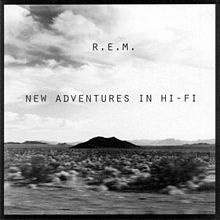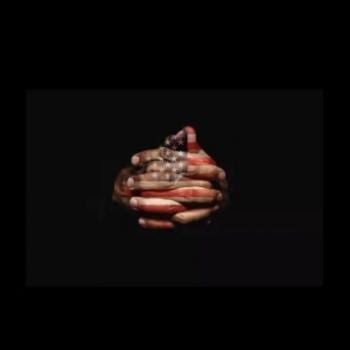When you grow up in a small town, it’s easy to assume that the world more or less mirrors the hierarchies and values of that microcosm, just at a larger scale. As a kid who didn’t hunt, play sports, or drink (although one of those would change dramatically in a few short years), the social and symbolic economies of my hometown did not really have much of a place for me. One thing I remember vividly is how the music that was available on the town’s few rock stations – almost all classic rock and post-Nirvana grunge of the Candlebox variety – tended to reinforce that sense of feeling trapped. Nirvana’s “Smells like Teen Spirit,” heard blasting through the speakers at my eighth grade graduation dance in between Whitney Houston and Bryan Adams, was of course a revelation for me; however, it wasn’t long before the same jocks who would beat up the nerds were blasting “All Apologies” and Smashing Pumpkins tracks from the speakers of the cars they could afford. So that wasn’t much of an out.
R.E.M., though, was different. It wasn’t that they were less commercial, or even less popular – “Everybody Hurts” was near-ubiquitous, with “Losing My Religion” close behind. What was different about them was how intractably WEIRD they insisted on staying. I had a VHS tape of REM videos from the Automatic for the People/Monster era, and I watched them over and over, recognizing in Michael Stipe’s aesthetic what I hear slightly older friends talk about discovering the first time they watched the Talking Heads’ “Stop Making Sense:” queerness in multiple senses, empowerment through strangeness, punk rock through beauty rather than formula.
R.E.M. blew up for me the parochial social economies of my small town. They showed me that the world was not only much larger, but much stranger. That the social Darwinism underpinned by Reagan-era Christian conservativism was itself the endangered species, and that a different mode of claiming space in a strange world could yield incredible literary and musical beauty.
New Adventures in Hi Fi, my favorite R.E.M. album, came out mid high school. It was a compelling musical document: the band had gone glam experimental (successfully, in my view, although not in the view of many fans and critics) with Monster, and New Adventures was the tour document of life on the road. A number of the tracks were recorded live at soundchecks, or even live in concert with minimal studio intervention later. Lyrically it moves wildly back and forth from themes of religious doubt and media overstimulation in America to a tribute to Stipe’s friend River Phoenix, who had recently overdosed. The overarching sonic mood of the album is that of near-exhaustion (which itself comported with one of Kerouac’s descriptions of the Beat generation – beatified because beaten down), but there is a strange vitality just under the surface. It’s the driver who should pull off to sleep but thinks that there might just be something more like home three exits up, and so another cup of coffee it is.
“E-Bow the Letter” was the first single from the album. The title is Reich-ian in its literal depiction of the music: Peter Buck applies an e-bow (a kind of vibrating pick that allows the string to sustain a long note, akin to a violin bow) to his electric guitar while Stipe speak-sings a surreal manifesto, only occasionally breaking into pitch. The overall subject of the letter appears to be a complaint about fame (which, oddly, is pretty much my least favorite lyrical topic from famous people), but the connection to the listener comes through Stipe’s trademark deployment of evocative phrases that are too abstract to be relevant but poetic enough to be resonant. They are words that invite the listener to do the work of filling in, “Aluminum, tastes like fear.” “These corrosives do their magic slowly and sweetly. Meanwhile, Patti Smith’s stunning guest intervention late in the song, repeating a key line – “holds us near, tastes like fear” – rescues Stipe’s delivery from collapse into solipsism. As his space closes in, she opens it up for the listener.
Indeed, the alchemy of the entire band (including the bass word of the highly underrated Mike Mills) plus Smith creates a sonic space that was truly “alternative” to anything I had encountered. It was a landscape to put my mind into away from the squeak of gym floors and the banal guitars of Bad Company and so. It was a place to rest in but also a place to act from, a place to hide when the world gets too strange but more often a place from which to work to make the world stranger, queerer, more lovely. It still is for me.
Rob Saler is Associate Dean and Research Professor of Lutheran Studies at Christian Theological Seminary in Indianapolis. He is the author of multiple books and articles in theology and cultural criticism, and is currently working on a book on theology and Radiohead.














